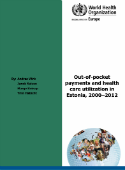Out-of-pocket payments and health care utilization in Estonia, 2000–2012 (2014)

Download
This paper analyses out-of-pocket payments, their impact on catastrophic expenditures and impoverishment in Estonia from 2000 to 2012. Microdata from the Estonian Household Surveys collected by Statistics Estonia were used, complemented by utilization data from other studies. Statistical and econometric methods were applied.
The results show that out-of-pocket expenditures peaked in 2006 and dropped thereafter. The decline is explained by the relative increase of pensions during the crisis years, promotion of generic drugs and reduced utilization of health care, especially dental care. Analysis of income-related inequalities in health care financing and utilization continues to show that for those services that are more dependent on out-of-pocket payments, there were either more inequalities in utilization, clearly demonstrated in adult dental care, or there was more risk of being pushed into poverty, such as in the case of spending on prescription and over-the-counter drugs by pensioners. Compared to previous studies, the impact of drug purchases on catastrophic expenditure has declined, which may be explained by both the changing attitudes towards cheaper drugs and increasing pensions relative to drug prices. Regarding the dental care, however, the picture is similar to earlier studies that high out-of-pocket payments cause low-income households to withdraw from the utilization of dental care services.



